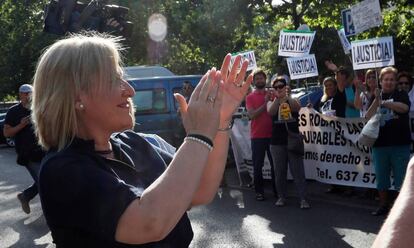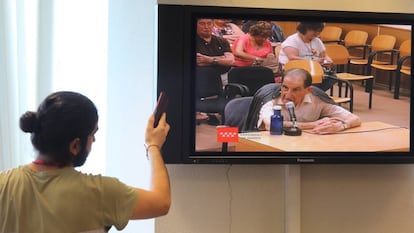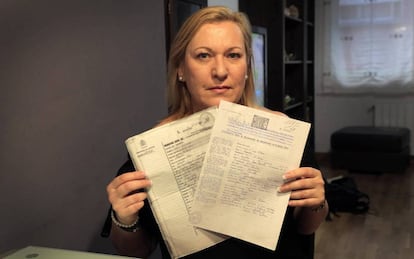First case of “Spain’s stolen babies” goes to trial in Madrid court
An 85-year-old doctor who allegedly headed the decades-long scheme denies any recollection of events


“I don’t know. I do not recall.” These were the answers provided on Tuesday by Eduardo Vela, a Spanish doctor who is on trial in a baby trafficking scheme that allegedly went on between 1961 and 1981 at the Madrid clinic that he headed.
Around 1,500 cases of suspected stolen babies have been reported in Spain as part of a scheme that is thought to have spanned decades. Most have been shelved due to the time that has elapsed since the incidents in question.
What I would like is for him to tell the truth, so that those mothers can tell their children: ‘I did not abandon you’
Inés Madrigal
The prosecution wants Vela to spend 11 years in prison for illegal detention and for falsifying childbirth records and other official documents in connection with a baby who was given away in 1969. This is the only case to have reached the courts so far since the scandal first came to light.
Vela used to work at a Madrid clinic called San Ramón, which is at the center of the scandal. His top aide was a nun named María Gómez Valbuena, who died four days after being summoned to testify in court.
In 1981, Spanish police arrested six people suspected of trafficking with newborns. The clinic in question was shut down, but the investigation reached a dead end.
The former head of the San Ramón clinic, who is now 85 years old, had tried to delay his court date for as long as possible, alleging health issues. But a forensic expert sent to examine him declared Vela fit to stand trial.
The hearings began this week with the case of Inés Madrigal, who was born in 1969. Although Vela’s name has cropped up often in connection with stolen babies, this is the only case that prospered, partly because Inés Madrigal filed a complaint against her adoptive mother, and partly because during the investigation phase the doctor admitted that he signed a document testifying to a delivery that never took place. Vela did not repeat this confession at the hearing inside the Madrid Regional Court.

Madrigal said in court that she began researching her own origins after reading an article in EL PAÍS about stolen babies at San Ramón clinic.
“It was an emotional slap in the face, a terrible blow,” she told the court. She had known since the age of 18 that she was adopted, but she believed that her biological mother had given her up for adoption because she lacked the means to take care of her.
Her adoptive mother, Inés Pérez, was told that the baby had been born to a woman who had an extra-marital affair while her husband was away. Pérez herself had been married for 19 years, but the couple had been unable to produce any children. Pérez began volunteering at a convent where parents sought help to raise their kids. There she would feed and change her wards, and she even took two of them, Paquito and Óscar, into her home for several periods of time.

In 2011 she told EL PAÍS that one day, she was told to go to the San Ramón clinic. “We have a surprise for you,” she was told. A doctor said: “Look what a present we have, a little girl for you.” Inés signed some papers and received instructions. “I had to put hot-water bottles inside the pram because she was premature. And if she got sick, I was to go see him directly, not to the hospital.”
It was 1969 and Inés Pérez was 46 years old. The documents stated that she had just given birth at the clinic, even though she had never even been pregnant. The doctor’s name was Eduardo Vela.
When the child turned 18, Pérez confessed the truth, and said that a priest at the convent where she volunteered had acted as a mediator. “I went to see the priest and he told me that my mother was a girl who could not keep me, with no further explanation,” said Inés Madrigal.
But Madrigal also asked for the doctor’s telephone number, and for years she kept it without daring to actually dial. “That was until 2010, when I saw an article in EL PAÍS about stolen babies at the San Ramón clinic, where I was born. I got scared.”
He told me to pretend I had nausea, and to stick a cushion under my clothes so it would look like a belly
Inés Pérez
Something similar happened to many women who gave birth at San Ramón within that time period, and who had been told that their babies were stillborn. And many adults who knew they were adopted and that they were born at San Ramón began wondering as well.
Madrigal’s is the first case to reach the courts. She provided DNA evidence that Inés Pérez is not her biological mother, and a birth certificate signed by Vela stating that she is. Then she filed a complaint against her adoptive mother to help the court case along.
“I told her, ‘I’m going to have to report you, mom.’ She understood that it was the best way to help me, and we agreed that if she ever changed her mind, I would drop the complaint,” says Madrigal.
At the time, Inés Pérez was 90 and both mother and daughter figured that even if she was charged, there would be few consequences because of her advanced age. “She was very brave. We are here because of her,” said her daughter.
Inés Pérez recognized Dr Vela, pointing him out as the man who told her how to act pregnant. “He told me to pretend I had nausea, and to stick a cushion under my clothes so it would look like a belly.”
After “gifting” her the baby, the doctor handed her some papers stating that she was the child’s biological mother. In court, Vela was shown the certificate and he recognized his signature but claimed that “I didn’t know what I was signing.”
Inés Pérez passed away in December 2016, at age 93. “She never believed that women had been lied to, or that babies were stolen, but she wanted to help me find my origins. She was told that the biological mother was a married woman who’d had an affair.”
After all this time, Madrigal admits that while she would like to see Vela convicted, she has no particular desire to see him behind bars. “What I would like is for him to tell the truth, so that those mothers can tell their children, ‘I did not abandon you’ and for those children to know that they were not abandoned.”
English version by Susana Urra.
Tu suscripción se está usando en otro dispositivo
¿Quieres añadir otro usuario a tu suscripción?
Si continúas leyendo en este dispositivo, no se podrá leer en el otro.
FlechaTu suscripción se está usando en otro dispositivo y solo puedes acceder a EL PAÍS desde un dispositivo a la vez.
Si quieres compartir tu cuenta, cambia tu suscripción a la modalidad Premium, así podrás añadir otro usuario. Cada uno accederá con su propia cuenta de email, lo que os permitirá personalizar vuestra experiencia en EL PAÍS.
En el caso de no saber quién está usando tu cuenta, te recomendamos cambiar tu contraseña aquí.
Si decides continuar compartiendo tu cuenta, este mensaje se mostrará en tu dispositivo y en el de la otra persona que está usando tu cuenta de forma indefinida, afectando a tu experiencia de lectura. Puedes consultar aquí los términos y condiciones de la suscripción digital.








































